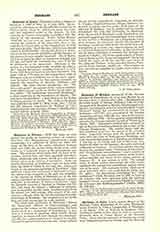

Hermann of Minden, provincial of the German province of Dominicans; b. at or near Minden on an unknown date; d. shortly after 1294. He belonged to the noble family of Scynne (Schinna), took the religious garb of St. Dominic at Minden, became papal penitentiary and chaplain, acted as vice-provincial “super Rhenum” during the provincialate of Conrad von Eschingen (1277-81), was provincial of the German Dominican province 1286-90, and vicar of the provincial in 1293 and 1294. In the capacity of provincial he attended the German national Council of Wurzburg in March, 1287. Hermann’s provincialate occurred in one of the most turbulent periods in the history of the German Dominicans. The secular clergy and the laity combined to prevent the spread of the youthful order. Especially serious were the quarrels of the order with the cities of Warburg and Strasburg, and with the cathedral chapters of Ratisbon and Zofingen. It was due to the energy and tact of Hermann that, despite all efforts to the contrary, the order continued to flourish in Germany. His literary activity was confined to two juridical works, “Tractatus de interdicto” and “De criminum inquisitionibus”, and a number of letters. The first was a concise treatise on the ecclesiastical interdict and based on the recent decrees of Innocent IV. It was written in 1270. The second work, of which neither manuscript nor print exists, regulated the inquisitorial proceedings against members of his order. His numerous letters, which are of great historical value, were published by Finke (loc. cit. infra). An instruction concerning the “cura monialium”, which Hermann sent in 1287 to those of his subjects who were entrusted with the spiritual guidance of nuns, was published by Denifle in “Archiv fur Literatur and Kirchengeschichte” (Berlin, 1886), II, 649-651.
MICHAEL OTT

